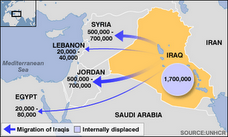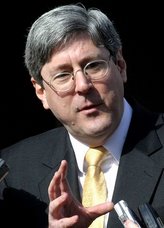
Gail Russell Chaddock focuses on the debate on Capitol Hill, noting that the draft law is “emerging as a flashpoint” in DC as well as in Baghdad. While the Bush administration has been leaning hard on the Iraqis to pass the law, Chaddock gives rare face time to US critics of the legislation as written, who voice misgivings about the law’s appearance to give undue advantage to foreign oil concerns over the interests of the Iraqis. While LaFranchi focuses more on the perilous Iraqi debate over distributing oil revenues, Chaddock quotes Iraqis who object to the draft over the issue of its approach to foreign contracts. Hasan Jum'a Awwad, head of the Iraqi Federation of Oil Unions, urged that Democrats "not link withdrawal with the oil law, especially since the USA claimed that it came to Iraq as a liberator and not in order to control Iraq's resources," in an open letter last week, she writes. Chaddock quotes other Iraqis, including an MP and a former oil minister, who are opposed to the law on the basis of its regulation of foreign firms. Because the law is ambiguously written, not all analysts share the view that the law favors foreign firms. But then again, if the law is ambiguously written, shouldn’t that raise a red flag too?
From Iraq, Howard LaFranchi writes about those on the receiving end of US pressure, Iraqi MPs and experts who argue that the process cannot be rushed to fit Washington’s timetable. There are no major bombshells or revelations, but LaFranchi does an excellent job in tying together the debate, which ranges between difficult and intractable, in a digestible way. Two important takeaways: First, even those parties most closely aligned with the US in Iraq are pushing for a longer delay in order to get the vote worked out. Second, as US pressure mounts, “The draft law could probably pass if put to a vote now, some analysts say, but its gaps and vague wording on key issues like contract-signing authority could mean big problems later and discourage essential foreign investment,” LaFranchi writes.
From Iraq, Howard LaFranchi writes about those on the receiving end of US pressure, Iraqi MPs and experts who argue that the process cannot be rushed to fit Washington’s timetable. There are no major bombshells or revelations, but LaFranchi does an excellent job in tying together the debate, which ranges between difficult and intractable, in a digestible way. Two important takeaways: First, even those parties most closely aligned with the US in Iraq are pushing for a longer delay in order to get the vote worked out. Second, as US pressure mounts, “The draft law could probably pass if put to a vote now, some analysts say, but its gaps and vague wording on key issues like contract-signing authority could mean big problems later and discourage essential foreign investment,” LaFranchi writes.





No comments:
Post a Comment